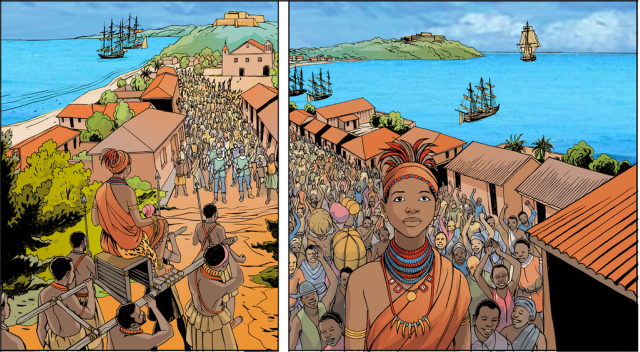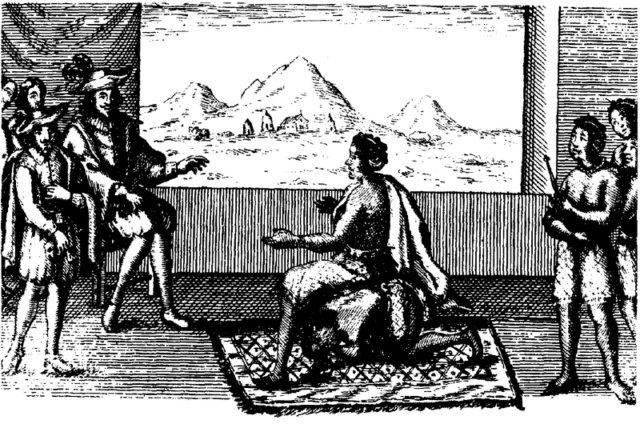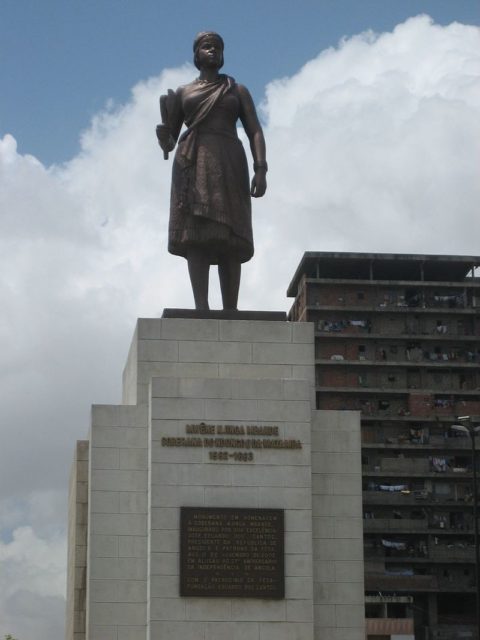The Portuguese started the European slave trade with Africa during the 15th century when they began kidnapping people from the continent’s west coast and transporting them back to Europe.
Through the years that followed Portugal would go on to become the first global empire in history, mostly because of their use of slave labor in gold mines and on sugar plantations.
However, in the late 16th century, England and France threatened Portugal’s dominance in the slave trade in northern and western Africa. The Portuguese began to seek new areas for exploitation, mainly in the Congo, Angola, and southwest Africa. What they didn’t expect to face there was an outstanding Angolan queen named Nzinga, who refused to surrender without a fight. In the decades that followed, she shaped the struggle against colonial forces in Africa.
Born in the early 1580s (some sources state 1580, others 1583) to King Kiluanji of Ndongo and his second wife Kangela, Queen Anna Nzinga, also known as Nzinga Mbande, would go on to define much of the history of 17th-century Angola.
Legend has it that she was named Nzinga because she was born with the umbilical cord wrapped around her neck — the Mbundu verb kujinga means to twist or turn. The Mbundu people believed that if a child was born with the umbilical cord wrapped around its neck they would grow to be proud and haughty.
Nzinga had two sisters and a brother but she was greatly favored by her father, who allowed her to witness his governance of the kingdom and often carried her with him to war against Portuguese invaders. Over the years she became a great warrior, a skilled hunter, an excellent diplomat, and a politician like no other. She was very intelligent and quickly learned to speak and write fluent Portuguese.

Nzinga’s life forever changed after her brother, Mbandi, took over the throne in 1617. She became a special emissary in negotiations with the Portuguese, who had already taken many people into slavery.
In 1622 her brother sent her to the city of Luanda to negotiate peace treaties with the Portuguese. It is said that she was refused a seat by the Portuguese governor, but she didn’t want to look inferior in the eyes of the governor so she sat on the back of one of her servants for the rest of the meeting.
A treaty was signed with the Portuguese and Nzinga converted to Catholicism, taking the name Dona Anna de Souza. The Portuguese never honored the treaty, though, and King Ngola Mbandi committed suicide (some accounts state that Nzinga killed her own brother). Nzinga became Queen of the Mbundu.

She refused the Portuguese demands for slave trade concessions and made it clear that her people would not surrender without a fight. The Portuguese attacked and burned down the capital of the Mbundu kingdom, so Nzinga and her people were forced to retreat. They moved to the mountains where they reorganized and again formed an army. She later established a kingdom within the territory of Matamba, where she formed alliances with other tribes against the Portuguese and offered sanctuary to all escaped slaves and Portuguese-trained African soldiers.
In 1641, she established a strategic alliance with the Dutch to fight off the Portuguese and seized Luanda. It was one of the first African-European alliances, but they never managed to drive the Portuguese out of Angola completely. The invaders eventually reclaimed the city.

Nzinga’s kingdom would go on to become very powerful and she and her people would continue fighting against the Portuguese for years. Even after Queen Nzinga died her kingdom resisted Portuguese colonization attempts until the 19th century.
The legends of Nzinga’s bravery and devotion in battles against the Portuguese inspired armed resistance in the 20th century that resulted in an independent Angola in 1975.
